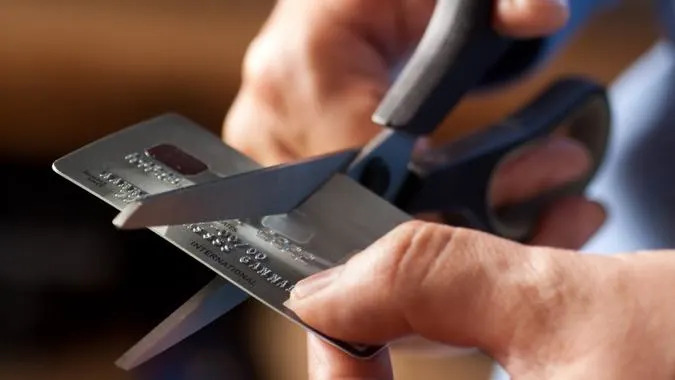One of the biggest obstacles to building wealth is overspending. Luckily, there are plenty of tips and tricks that can help you stop throwing money away on unnecessary purchases and save and invest in your financial future.
See More: We’re a Family of 5 Living on One Salary — Here’s Our Monthly Budget
Read Next: 5 Types of Cars Retirees Should Stay Away From Buying
Money expert Rachel Cruze recently shared on YouTube her best practices to manage your spending. Here’s what you need to do if you’re working to grow your wealth.

Kateryna Onyshchuk / Getty Images/iStockphoto
Identify Your Spending Tendencies
Who are you when it comes to spending money? Cruze uses the example that some people are natural spenders while others are savers. Ask yourself whether you prioritize buying quality items or quantity to better understand how and why you spend money.
Be Aware: 8 Frugal Habits Americans Are Ridiculed for — and Why You Shouldn’t Care
View More: Ways To Save Money That Actually Work in 2025

Delmaine Donson / iStock/Getty Images
Create a Budget
One of the biggest misconceptions about having a budget is that it means you can’t spend money.
On the contrary, a budget helps you keep from overspending. Cruze said your monthly budget should have your income at the top along with a list of all your expenses and the amounts you’re giving and putting into savings. Place dollar amounts next to each one.
“The goal is your income minus all of those expenses and giving and saving should equal zero,” Cruze said, adding that if you’re spending within what you budgeted, you’re not going to overspend.
Explore Next: Clever Ways To Save Money That Actually Work in 2025

praetorianphoto / Getty Images
Set Money Goals
Are you in student loan debt? Plan to pay it off in full. Do you need to buy a used car? Start saving money now to buy it in cash.

nd3000 / iStock.com
Track Your Spending
How much do you really spend every day? You can track these purchases and their amounts by writing them down or using an app.

lechatnoir / Getty Images
Do a No-Spend Challenge
Commit to a month where you’re spending money only on necessities like shelter, groceries, utilities and transportation. Cancel any monthly subscriptions to streaming services and avoid scrolling through Amazon for items you don’t need.
By retooling your mindset to buy only what you need, Cruze said, you might be able to reset the way you spend money.
Try This: 9 Downsizing Tips for the Middle Class To Save on Monthly Expenses

Neustockimages / iStock.com
Don’t Eat Out
It will always cost more money to eat out than to cook at home.
If you want to start a no-spend challenge, Cruze recommends trying a “don’t go out to eat challenge.” Spend a full season cooking at home and track how much you save. (Spoiler: You’re going to save a lot of money.)

xavierarnau / Getty Images
Plan Your Meals
If you don’t know what you’re having for dinner, you’ll be all the more likely to go out to eat rather than cook. (This is especially true if it has been a long day.) Become intentional with your meals and meal prep them out for a full week.

Jacob Wackerhausen / iStock.com
Spend With Cash
You spend a lot less money if you stick to using cash only: yes, really. Put your credit or debit card away and use cash to get better control on your spending habits.
Discover More: 4 Surprising Things That Could Impact Your Wallet If a Recession Hits

MarsBars / Getty Images/iStockphoto
Get Debt Out of Your Life
Make necessary moves that actively put money back into your pocket, like getting rid of credit cards.

DragonImages / Getty Images
Rethink Retail Therapy
It’s not uncommon to “fix” a bad day by going on a shopping spree or celebrate a win by “treating yourself” to expensive things.
If you’re scrolling online and worry you may start shopping for things you don’t need, Cruze recommends putting down the smartphone or iPad and going for a walk, listening to your favorite podcast or completing some tasks you’ve been putting off.

tdub303 / iStock.com
Say No To Sales
Even if something on sale seems like a good deal, that doesn’t mean it’s a good deal for you.
That’s Interesting: 8 Frugal Habits You Should Never Quit, According to Frugal Living Expert Austin Williams

sergiophoto84 / Getty Images
Shop With a List
Whether you’re shopping for groceries or back-to-school supplies, sticking to a list keeps you on budget and keeps from buying things you don’t need.

Halfpoint / Getty Images/iStockphoto
Limit Social Media
Now more than ever, curated ads and influencers on social media platforms are showing us all sorts of things we never knew existed that we should spend money on. If you take a break from social media, you’ll be able to save more money since it’s now out of sight and out of mind.

Jose Calsina / iStock.com
Pause Before You Spend
Instead of hitting “place order” or “buy now,” wait a few hours. Better yet, wait 24 hours. Then come back to your online shopping cart and ask yourself whether you really needed what’s in it.
Trending Now: 25 Creative Ways To Save Money

Valeriy_G / Getty Images/iStockphoto
Use What You Have
Go through your closet. Dig through your pantry. Comb through the junk drawer. Chances are pretty good you might already have some of the things you were planning to go out and buy new already at home, like an extra bottle of shampoo or pasta sauce.

stockstudioX / Getty Images
Hold Yourself Accountable
You don’t have to curb your spending habits alone. Share your plans with a close friend, partner or trusted mentor who is good with money. Run your ideas past them or get their feedback on what you’re doing to better hold yourself accountable for your actions.
More From GOBankingRates
This article originally appeared on GOBankingRates.com: 16 Ways To Stop Wasting Your Money and Build Wealth, According to Rachel Cruze
